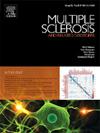Improvement of measured and perceived disability in overweight patients with Multiple Sclerosis trough different patterns of Mediterranean hypocaloric diet
IF 2.9
3区 医学
Q2 CLINICAL NEUROLOGY
引用次数: 0
Abstract
Objectives
overweight and other cardiovascular risk factors are known contributors to disability accrual in Multiple Sclerosis (MS). We aimed to explore the impact of three hypocaloric dietetic patterns, based on the Mediterranean diet, on cardiovascular risk and clinical status in overweight persons with MS (pwMS).
Material and Methods
overweight pwMS (body mass index-BMI ≥25 kg/m2) were prospectively enrolled, randomly allocated to three hypocaloric dietetic plans differing in macronutrients composition (carbohydrates/proteins/lipids: diet A 65 %/15 %/20 %; diet B 35 %/25 %/40 %; diet C 50 %/20 %/30 %) and followed-up for 1 year (6 months of dietetic intervention + 6 months of observation). The Multiple Sclerosis Performance Test, a self-administered, iPad®-based system for quantifying cognition, upper and lower extremity motor function, and vision was performed at baseline, 6 and 12 months. Questionnaires for the evaluation of sleep quality, fatigue, anxiety, depression, stigma, social participation and satisfaction were administered. Information about cardiovascular risk parameters (BMI, waist circumference-WC, umbilical circumference-UC, hip circumference-HP, blood pressure, HDL and LDL cholesterol, triglycerides, glycemia) were collected. Adherence to the dietetic plan was quantified as days of complete to insufficient adherence across the treatment period. Between-group comparisons were performed with Chi-square and ANOVA; longitudinal analyses with one-way ANOVA for repeated measures and mixed-design ANOVA.
Results
fifty-three patients completed the study (diet A n = 19, diet B n = 18, diet C n = 16). The three groups were well matched for sex, age, disease duration and EDSS. Along the 6 months of dietetic intervention, no difference in adherence was detected across the three dietetic plans (p = 0.84). Overall, patients showed a significant weight loss over time (p < 0.001) with no difference across diets (p = 0.34). BMI, WC, UC, HC and cholesterol improved over time (p ranging from 0.06 to 0.001), with no differences across diets (p ranging from 0.16 to 0.58). Among all tested clinical variables, fatigue, anxiety, information processing speed and manual dexterity improved significantly (p = 0.005, p = 0.012, p = 0.013, p = 0.005), with no differences across diets (p = 0.84, p = 0.89, p = 0.53, p = 0.72).
Conclusion
dietetic interventions in overweight pwMS, irrespective of their specific macronutrients composition, are able to improve the cardiovascular profile, the perception of subjective symptoms as well as objective disability scores.
通过不同模式的地中海低热量饮食改善超重多发性硬化症患者的测量和感知残疾
目的:超重和其他心血管危险因素是已知的导致多发性硬化症(MS)致残的因素。我们旨在探讨基于地中海饮食的三种低热量饮食模式对超重多发性硬化症(pwMS)患者心血管风险和临床状况的影响。材料和方法:前瞻性纳入超重pwMS(体重指数- bmi≥25 kg/m2),随机分配到三种不同常量营养素组成的低热量饮食计划(碳水化合物/蛋白质/脂质:饮食A 65% / 15% / 20%;日粮B 35% / 25% / 40%;饮食C为50% / 20% / 30%),随访1年(6个月饮食干预+ 6个月观察)。多发性硬化症性能测试是一种基于iPad®的自我管理系统,用于量化认知、上肢和下肢运动功能和视力,在基线、6个月和12个月进行。对睡眠质量、疲劳、焦虑、抑郁、耻辱、社会参与和满意度进行问卷评估。收集心血管危险参数信息(BMI、腰围-腰围、脐围-腰围、臀围-腰围、血压、HDL和LDL胆固醇、甘油三酯、血糖)。对饮食计划的坚持被量化为在整个治疗期间完全坚持到不充分坚持的天数。组间比较采用卡方分析和方差分析;采用重复测量的单因素方差分析和混合设计方差分析进行纵向分析。结果:53例患者完成研究(饮食A 19例,饮食B 18例,饮食C 16例)。三组在性别、年龄、病程和EDSS方面匹配良好。在6个月的饮食干预中,三种饮食计划的依从性没有差异(p = 0.84)。总的来说,随着时间的推移,患者的体重明显减轻(p < 0.001),不同饮食之间没有差异(p = 0.34)。BMI、WC、UC、HC和胆固醇随着时间的推移而改善(p范围从0.06到0.001),不同饮食之间没有差异(p范围从0.16到0.58)。在所有测试的临床变量中,疲劳、焦虑、信息处理速度和手灵巧性显著改善(p = 0.005, p = 0.012, p = 0.013, p = 0.005),不同饮食之间无差异(p = 0.84, p = 0.89, p = 0.53, p = 0.72)。结论:对超重的pwMS进行饮食干预,无论其特定的宏量营养素组成如何,都能够改善心血管状况、主观症状的感知以及客观残疾评分。
本文章由计算机程序翻译,如有差异,请以英文原文为准。
求助全文
约1分钟内获得全文
求助全文
来源期刊

Multiple sclerosis and related disorders
CLINICAL NEUROLOGY-
CiteScore
5.80
自引率
20.00%
发文量
814
审稿时长
66 days
期刊介绍:
Multiple Sclerosis is an area of ever expanding research and escalating publications. Multiple Sclerosis and Related Disorders is a wide ranging international journal supported by key researchers from all neuroscience domains that focus on MS and associated disease of the central nervous system. The primary aim of this new journal is the rapid publication of high quality original research in the field. Important secondary aims will be timely updates and editorials on important scientific and clinical care advances, controversies in the field, and invited opinion articles from current thought leaders on topical issues. One section of the journal will focus on teaching, written to enhance the practice of community and academic neurologists involved in the care of MS patients. Summaries of key articles written for a lay audience will be provided as an on-line resource.
A team of four chief editors is supported by leading section editors who will commission and appraise original and review articles concerning: clinical neurology, neuroimaging, neuropathology, neuroepidemiology, therapeutics, genetics / transcriptomics, experimental models, neuroimmunology, biomarkers, neuropsychology, neurorehabilitation, measurement scales, teaching, neuroethics and lay communication.
 求助内容:
求助内容: 应助结果提醒方式:
应助结果提醒方式:


